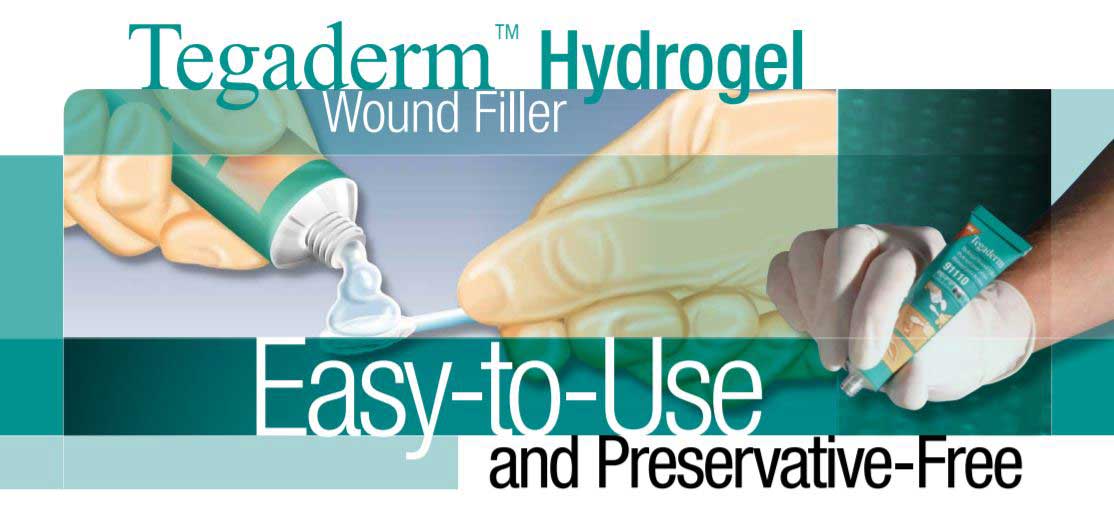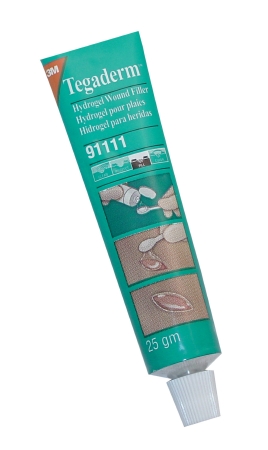Description
3M 91111 - HYDROGEL, WOUND FILLER, TEGADERM, 0.88OZ, 100/CS

3M Tegaderm Hydrogel Wound Filler 91110, 25 gm, 10 Tubes/ Box, 10 Boxes/ Case

Hydrogel Wound Filler
3M Tegaderm Hydrogel Wound Filler is a sterile, non-preserved, amorphous hydrogel formulated to provide moisture to a dry wound, maintain a moist wound environment which enhances wound healing and helps prevent wound desiccation, and promote autolytic debridement of a dry wound by providing moisture to devitalized tissue. Ingredients: water, propylene glycol, guar gum and sodium tetraborate.
Amorphous hydrogel, formulated to help provide a moist wound healing environment that has been shown to enhance wound healing. Available in single-dose tubes.
- Preservative-free
- Easy to apply
- Convenient 15 gram and 25 gram sizes for single-patient use
- Latex-free
Indications for use
Tegaderm Hydrogel Wound Filler is indicated as a primary wound filler for non to minimally draining partial and full thickness dermal wounds including:
- pressure ulcers
- venous ulcers
- arterial ulcers
- diabetic ulcers
- abrasions and lacerations
- grafts and donor sites
- post operative surgical wounds
- cavity wounds
- wounds exhibiting dry eschar and fibrinous slough
Composition/information on ingredients
| Ingredient | CAS Nbr | % by Weight |
| Sodium Tetraborate | 1330-43-4 | < 0.1 |
| Water | 7732-18-5 | > 80 |
| Propylene glycol | 57-55-6 | < 15 |
| Guar gum | 9000-30-0 | 1 - 5 |
Suggested Applications
- Dry to minimally draining dermal ulcers: pressure, arterial, venous, diabetic
- Wounds with eschar or slough requiring autolytic debridement
- Open surgical wounds
- Traumatic wounds, abrasions
Precautions
- For external use only.
- Do not use on patients with a known sensitivity to propylene glycol.
- Treatment of any wound should be part of a well-defined plan and under the supervision of a health care professional.
- Bleeding should be controlled before application of wound fillers or cover dressings.
- When using wound fillers or dressings, the wound may initially appear larger in size and depth as unnecessary tissue is cleaned away. This increase should be accompanied by an improved appearance of the wound. If the wound gets larger after the first few dressing changes, consult a health care professional.
- Observe the wound for signs of infection. Consult a health care professional if any of the following are noted: fever, increased pain, redness, bleeding, swelling, unusual odor, increased drainage or cloudy or foul drainage.
- Tegaderm Hydrogel Wound Filler may be used on infected wounds only under the care of a health care professional.
- Rarely, with wound filler or dressing use, irritation (redness), or maceration (whitening) of the surrounding skin, or hypergranulation (excessive tissue formation in the wound) may develop. Should this occur, consult a health care professional.
- If the wound does not begin to show signs of healing or if any other unexpected symptoms occur, consult a health care professional.
- Single use only, once opened this product should not be reused due to risk of contamination and infection.
Directions for Use
Note: Follow facility guidelines for infection control.
- Cleanse wound and surrounding skin according to facility policy.
Note: If periwound skin is fragile or exposure to wound exudate is likely, apply a barrier film such as 3M Cavilon No Sting Barrier Film. Allow the barrier film to dry before dressing application. - Apply enough Tegaderm Hydrogel Wound Filler to cover the wound base and any necrotic tissue, to a depth of approximately 5 mm thick, with no overlap onto the surrounding skin.
- Alternatively, a sterile gauze pad may be saturated with Tegaderm Hydrogel Wound Filler and placed into the wound with no overlap onto the surrounding skin.
- Apply an appropriate cover dressing to help manage the wound drainage and maintain a moist wound environment.
Removing the Dressing
- Change the dressing as needed. Tegaderm Hydrogel Wound Filler may be left in place for up to 3 days. Frequency of changing will depend on factors such as the type of wound and volume of drainage.
- At the time of dressing change, rinse away remaining gel with wound cleanser or sterile normal saline if necessary.
- At the time of dressing change, if the dressing is adhered to the wound surface, saturate with wound cleanser or sterile normal saline, allow the dressing to soften, and gently remove.
- Avoid forceful removal of the dressing to minimize disruption of the wound.
3M Tegaderm Hydrogel Wound Filler | Commonly Asked Questions
Question: What cover dressings are appropriate to use with 3M Tegaderm Hydrogel Wound Filler?
Answer: Hydrogels require a cover dressing; the choice is determined by the clinician. Options include: 3M Tegaderm Transparent Film Dressings, 3M Tegaderm +Pad Film Dressing with non-adherent Pad, and 3M Medipore +Pad Soft Cloth Adhesive Wound Dressing.
Question: Can Tegaderm Hydrogel be used on infected wounds?
Answer: Tegaderm Hydrogel may be used on infected wounds only under the care of a health care professional. If a wound infection develops, consult a physician and implement appropriate medical treatment. Progress of the wound infection should be monitored under medical supervision, but use of Tegaderm Hydrogel need not be discontinued.
